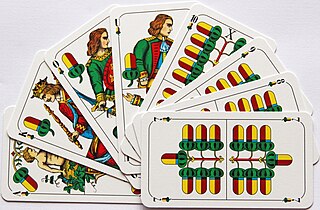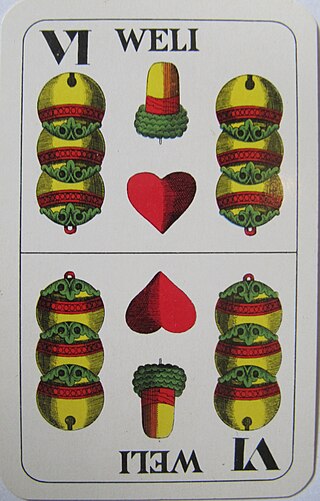Card players are those participating in a card game. Various names are given to card players based on their role or position.
Elfern or Elfmandeln, is a very old, German and Austrian 6-card, no-trump, trick-and-draw game for two players using a 32-card, French-suited Piquet pack or German-suited Skat pack. The object is to win the majority of the 20 honours: the Ace, King, Queen, Jack and Ten in a Piquet pack or the Ace, King, Ober, Unter and Ten in a Skat pack. Elfern is at least 250 years old and a possible ancestor to the Marriage family of card games, yet it is still played by German children.
Réunion, Reunion or Vereinigungsspiel is an historical German point-trick game for three players which, despite its French name, appears to have originated in the central Rhineland and lowland areas to the east. It is a 10-card game of the Ace-Ten family and uses a 32-card French-suited piquet pack or 32-card Skat pack. Players who cannot follow suit must trump. Otherwise the game can be described as a simplified version of Skat, but is also reminiscent of Euchre with its two permanent top trumps, the Right and Left Bowers.

Tippen, also known as Dreiblatt, Dreikart, Drei Karten, Dreekort, Kleinpréférence or Labet, is an historical German 3-card, plain-trick game which was popular as a gambling game for three or more players. The Danish version of the game was known as Trekort and more elaborate Swedish variants include Knack and Köpknack. It appears to be related to the English game of 3-Card Loo. It was banned as a gambling game in some places.
Ramsch, formerly also called Mike in East Germany, is a card game based on the contract of the same name in the popular German card games, Skat and Schafkopf. However, thanks to its interesting mode of play it has since developed into an independent game in its own right which is only loosely based on Skat or Schafkopf. It should not be confused with the games of the Rams family – Ramsen and Ramscheln – that also go by the name Ramsch.
Mizerka is a trick-taking card game belonging to the Whist group. Mizerka is a three-person game. Although it originates in Poland, Mizerka's popularity has largely increased in the United States. What distinguishes Mizerka from tradition trick is the use of a fourth dealt pile, serving as a "grab bag" for players to exchange their cards. This pile is referred to as the talon.

Gaigel is a card game from the Württemberg region of Germany and is traditionally played with Württemberg suited cards. It is a Swabian variant of Sechsundsechzig and may be played with 2, 3, 4 or 6 players. However, a significant difference from Sechsundsechzig and other related games like Bauernschnapsen is the use of a double card deck. The four-player game is usually called Kreuzgaigel. The game emerged in the early 19th century.

Watten, regionally also called Watteln or Wattlung, is a card game that is mainly played in Bavaria, Austria, Switzerland and South Tyrol. There are several main variants: Bavarian, Bohemian, South Tyrolean (Stichwatten), (Austrian) Tyrolean, Kritisch and Blind Watten. It is usually a 4-player game, which is "by far the most interesting", but it may also be played by 2 or 3 players. According to Parlett, Watten is "hard to describe [but] fun to play and easy to learn."
Bassadewitz is an old German card game for 4 players that is still played today. It is a member of the Hearts family of games.

Binokel is a card game for two to eight players that originated in Switzerland as Binocle, but spread to the German state of Württemberg, where it is typically played with a Württemberg pattern pack. It is still popular in Württemberg, where it is usually played in groups of three or four as a family game rather than in the pubs. In three-hand games, each player competes for himself, while in four-hand games, known as Cross Binokel (Kreuzbinokel), two teams are formed with partners sitting opposite one another. The game was introduced to America by German immigrants in the first half of the 20th century, where it developed into the similar game of pinochle. Binocle was still played in Switzerland in 1994. In south Germany, the game is sometimes called by its Swabian name, Benoggl.

Wallachen is an Old Bavarian card game which used to be very popular in eastern Bavaria. Although, by 2012, it had become a rarer sight at pub tables, there have been more recent moves to revive it. Wallachen is a relatively simple three-hander that is easy to learn. As a result, like Grasobern, it has a relatively relaxed character without the mental demands of Schafkopf or the psychological stress of Watten.

Rosbiratschka is a trick-taking, compendium, card game for three or four players that is played with a German-suited pack of 32 or 24 cards.

Herzla or Herzl'n is a Bavarian, reverse trick-taking, card game for 4 players in which the aim is to avoid taking any Hearts. There is a simpler variant for children and adults that may be played by 3-8 players.
Lampeln or Lampln is an old Bavarian and Austrian plain-trick card game that is still played in a few places today. It is one of the Rams group of card games characterised by allowing players to drop out of the current game if they think they will be unable to win any tricks or a minimum number of tricks.

Mulatschak or Fuchzenawa is an Austrian card game for two to five players that comes from the Salzburg area and is considered the quintessential game of the region. Although Mulatschak has been called the national card game of Salzburg, its rules were almost certainly unpublished before 2004. Mulatschak is a member of the Rams family in which the key feature is that players may choose to drop out of the game if they believe their hand is not strong enough to take a minimum number of tricks. There is a variant known as Murln or Murlen, which is played in Vienna and the Styria.

Kratzen is an Austrian card game for three to six players that is played for small stakes usually using a 33-card William Tell pack. It is a member of the Rams group of card games characterised by allowing players to drop out of the current game if they think they will be unable to win any tricks or a minimum number of tricks. The game is related to the Swiss Jass form, Chratze and has been described as "fun" to play.
Bester Bube or Fünfkart is an historical German card game for 3–6 players played with a Piquet pack. It is one of the Rams group of card games characterised by allowing players to drop out of the current game if they think they will be unable to win any tricks or a minimum number of tricks. It may be an ancestor of Five-Card Loo.

Letzter Stich is a card game for 3 or 4 players in which the aim is solely to win the last trick. It originated in Germany and the names mean "last trick" respectively. It has been described as suitable for children, yet having a "surprising wealth of interesting game situations." It should not be confused with Letzter, a reverse game of greater complexity where the aim is to lose the last trick.

My Ship Sails, also called My Bird Sings, is an English card game for children that is played with a 52-card French pack. It appears related to the 17th-century gambling game, My Sow's Pigg'd. In 19th century Shropshire, the latter game went under the name of Wizzy, Wizzy, Wee; the aim was to collect cards of the same suit, the first to do so throwing their hand on the table and crying "My sow's pigged!" or "Wizzy, wizzy, wee!".
Cucumber is a north European card game of Swedish origin for two or more players. The goal of the game is to avoid taking the last trick. David Parlett describes it as a "delightful Baltic gambling game".









